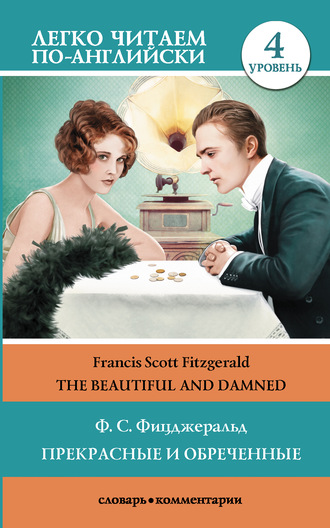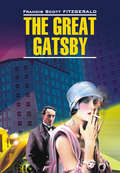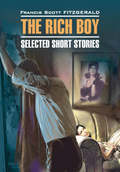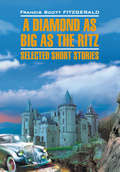
Фрэнсис Скотт Фицджеральд
The Beautiful and Damned / Прекрасные и обреченные. Уровень 4
Turbulence
Anthony turned over sleepily in his bed. Bounds was close to the bed, his dark-brown eyes fixed imperturbably upon his master.
Anthony blinked.
“Bounds.”
“Yes, sir?”
“Can you come around about four and serve some tea and sandwiches or something?”
“Yes, sir.”
“Some sandwiches,” Anthony repeated helplessly, “oh, some cheese sandwiches and chicken and olive, I guess.”
He shut his eyes wearily, let his head roll to rest inertly, and quickly relaxed. Richard Caramel had called on him[17] at midnight; they had drunk four bottles of beer.
Suddenly he was awake, saying: “What?”
“For how many, sir?” It was still Bounds, standing patient and motionless.
“How many what?”
“I think, sir, I’d better know how many are coming. I’ll have to plan for the sandwiches, sir.”
“Two,” muttered Anthony huskily; “lady and a gentleman.”
Bounds said, “Thank you, sir,” and moved away.
After a long time Anthony arose. With a last yawn he went into the bathroom. Then he lit a cigarette and glanced through several letters and the morning Tribune.
An hour later, shaven and dressed, he was sitting at his desk looking at a small piece of paper he had taken out of his wallet. “Dick and Gloria Gilbert for tea.”
These words brought him obvious satisfaction. In justification of his manner of living there was first, of course, The Meaninglessness of Life. From a world fraught with the stupidity of many Geraldines he was thankfully delivered.
But he found in himself a growing horror and loneliness. The idea of eating alone frightened him; in preference he dined often with men he detested. Travel, which had once charmed him, seemed unendurable.
And yet he wanted something, something. After cocktails and luncheon at the University Club Anthony felt better. He was Anthony Patch, brilliant, magnetic, the heir of many years and many men. With his grandfather’s money he might build his own pedestal. The clarity of his mind, its sophistication, its versatile intelligence. He tried to imagine himself in Congress. Little men with copy-book ambitions, the lustreless and unromantic heaven of a government.
Back in his apartment the grayness returned. His thoughts were bitter. Anthony Patch with no achievement, without courage, without strength. Oh, he was a pretentious fool, making careers out of cocktails. He was empty, it seemed, empty as an old bottle.
The buzzer rang at the door. Anthony sprang up and lifted the tube to his ear. It was Richard Caramel’s voice, stilted and facetious:
“Announcing Miss Gloria Gilbert.”
The Lady
“How do you do?” he said, smiling and holding the door ajar.
Dick bowed.
“Gloria, this is Anthony.”
“Well!” she cried.
“Let me take your things.”
Anthony stretched out his arms and the brown mass of fur tumbled into them.
“Thanks.”
“What do you think of her, Anthony?” Richard Caramel demanded barbarously. “Isn’t she beautiful?”
“Well!” cried the girl defiantly.
She was dazzling.
“I’m a solid block of ice,” murmured Gloria, glancing around. “We found a place where you could stand on an iron-bar grating, and it blew warm air up at you – but Dick wouldn’t wait there with me. I told him to go on alone and let me be happy.”
She seemed talking for her own pleasure, without effort. Anthony, sitting at one end of the sofa, examined her profile: the exquisite regularity of nose and upper lip, the chin, balanced beautifully on a rather short neck.
“I think you’ve got the best name I’ve heard,” she was saying, still apparently to herself. “Anthony Patch. You look like Anthony, rather majestic and solemn.”
Anthony smiled.
“My name is too flamboyant,” she went on, “I used to know two girls named Jinks, though, and just think what they were named – Judy Jinks and Jerry Jinks. Cute, what? Don’t you think?”
“Everybody in the next generation,” suggested Dick, “will be named Peter or Barbara – because at present all the piquant literary characters are named Peter or Barbara.”
Anthony continued the prophecy:
“Of course Gladys and Eleanor.”
“Displacing Ella and Stella,” interrupted Dick.
“And Pearl and Jewel,” Gloria added cordially, “and Earl and Elmer and Minnie.”
“Where are you from?” inquired Anthony.
“Kansas City, Missouri.”
“I must confess,” said Anthony gravely, “that even I’ve heard one thing about you.”
She sat up straight.
“Tell me. I’ll believe it. I always believe anything any one tells me about myself.”
“I’m not sure that I ought to,” said Anthony. She was so obviously interested.
“He means your nickname,” said her cousin.
“What name?” inquired Anthony, politely puzzled.
Instantly she was shy – then she laughed, and turned her eyes up as she spoke:
“Coast-to-Coast Gloria.” Her voice was full of laughter. “O Lord!”
Still Anthony was puzzled.
“What do you mean?”
“Me, I mean. That’s what some silly boys called me.”
“Don’t you see, Anthony,” explained Dick, “a great traveler? Isn’t that what you’ve heard? She’s been called that for years – since she was seventeen.”
“What have you heard of me?” asked she.
“Something about your tan.”
“My tan?” She was puzzled. Her hand rose to her throat.
“Do you remember Maury Noble? Man you met about a month ago. You made a great impression.”
She thought a moment.
“I remember – but he didn’t call me up.”
“He was afraid to, I don’t doubt.”
Dissatisfaction
On Thursday afternoon Gloria and Anthony had tea together in the grill room at the Plaza. She seemed so young, scarcely eighteen; her form was amazingly supple and slender, and her hands were small as a child’s hands should be.
Gloria considered several locations, and rather to Anthony’s annoyance paraded him to a table for two at the far side of the room. Would she sit on the right or on the left? Anthony thought again how naïve was her every gesture.
She watched the dancers, commenting murmurously.
“There’s a pretty girl in blue, there! No. Behind you – there!”
“Yes,” he agreed helplessly.
“You didn’t see her.”
“I’d rather look at you.”
“I know, but she was pretty. Except that she had big ankles.”
“Did she?” he said indifferently.
A girl’s salutation came from a couple dancing close to them.
“Hello, Gloria! O Gloria!”
“Hello there.”
“Who’s that?” he demanded.
“I don’t know. Somebody.” She caught sight of another face. “Hello, Muriel!” Then to Anthony: “There’s Muriel Kane[18]. Now I think she’s attractive, but not very.”
Anthony chuckled.
“Attractive, but not very,” he repeated.
She smiled.
“Why is that funny? Do you want to dance?”
“Do you?”
“Sort of. But let’s sit,” she decided.
“And talk about you? You love to talk about you, don’t you?”
“Yes.” She laughed.
“I imagine your autobiography is a classic.”
“Dick says I haven’t got one.”
“Dick!” he exclaimed. “What does he know about you?”
“Nothing. But he says the biography of every woman begins with the first kiss, and ends when her last child is laid in her arms.”
“He’s talking from his book.”
“He says unloved women have no biographies – they have histories.”
Anthony laughed again.
“Then why haven’t you a biography? Haven’t you ever had a kiss that counted?”
“I don’t know what you mean ‘counts,’” she objected.
“I wish you’d tell me how old you are.”
“Twenty-two,” she said. “How old did you think?”
“About eighteen.”
“Let’s be eighteen, then. I don’t like being twenty-two. I hate it more than anything in the world.”
“Being twenty-two?”
“No. Getting old and everything. Getting married.”
“Don’t you ever want to marry?”
“I don’t want to have responsibility and a lot of children to take care of.”
He waited rather breathlessly for her next remark. She was smiling, without amusement but pleasantly.
“What do you do with yourself?[19]” she asked.
Anthony was in a mood to talk. He wanted, moreover, to impress this girl. He wanted to pose.
“I do nothing,” he began. “I do nothing, for there’s nothing I can do that’s worth doing.”
“Well?” He had not surprised her.
“Don’t you approve of lazy men?”
She nodded.
“I want to know just why it’s impossible for an American to be gracefully idle, it astonishes me.
I don’t understand why people think that every young man ought to go downtown and work ten hours a day for the best twenty years of his life at dull, unimaginative work.”
She watched him inscrutably. He waited for her to agree or disagree, but she did neither.
“Don’t you ever form judgments on things?” he asked with some exasperation.
She shook her head and her eyes wandered back to the dancers as she answered:
“I don’t know. I don’t know anything about – what you should do, or what anybody should do. I don’t mind if people don’t do anything. I don’t see why they should; in fact it always astonishes me when anybody does anything.”
“You don’t want to do anything?”
“I want to sleep.”
“Sleep?”
“Sort of. I want to just be lazy and I want some of the people around me to be doing things, because that makes me feel comfortable and safe. And some of them can do nothing at all, because they can be graceful and companionable for me. But I never want to change people.”
“You’re a little determinist,” laughed Anthony. “It’s your world, isn’t it?”
“Well,” she said, “isn’t it? As long as I’m – young.”
She paused slightly before the last word and Anthony suspected that she wanted to say “beautiful.”
Admiration
That winter afternoon at the Plaza was the first of a succession of “dates” Anthony made with her before Christmas. Invariably she was busy. She attended the charity dances at the big hotels; he saw her several times at dinner parties.
He made engagements with her several times for lunch and tea. She was sleepy, incapable of concentrating upon anything.
One Sunday afternoon just before Christmas he called up and found her after some important but mysterious quarrel.
“Let’s go to something!” she proposed. “I want to see a show, don’t you? Oh, let’s go somewhere!”
“We’ll go to a good cabaret.”
“I’ve seen every one in town.”
“Well, we’ll find a new one.”
“Well, come on, then.”
A dozen blocks down Broadway Anthony’s eyes were caught by a large and unfamiliar electric sign “Marathon” in glorious yellow script.
“Shall we try it?”
With a sigh Gloria tossed her cigarette out the open door; then they had passed under the screaming sign, under the wide portal, and up by a stuffy elevator into this palace of pleasure.
There on Sunday nights gather the credulous, sentimental, underpaid, overworked people: book-keepers, ticket-sellers, office-managers, salesmen, and, most of all, clerks – clerks of the mail, of the grocery, of the brokerage, of the bank.
Anthony and Gloria sat down.
“How do you like it?” inquired Anthony.
“I love it,” she said frankly. Her gray eyes roved here and there, drowsing on each group, passing to the next. They two, it seemed to him, were alone quiet.
“I’m like these people,” she murmured. “I’m like they are – like Japanese lanterns and crape paper, and the music of that orchestra. I am like them. You don’t know me.” She hesitated. “These people could appreciate me, and these men would fall in love with me and admire me, whereas the clever men I meet would just analyze me and tell me I’m this because of this or that because of that.”
Chapter III
Gloria
From his undergraduate days Richard Caramel had desired to write.
“I’m absorbed, Aunt Catherine,” he told his aunt, “I really am. All my friends are joshing me – but I don’t care.”
“You’re an ancient soul, I always say.”
“Maybe I am. But where is my cousin Gloria? I think my friend Anthony Patch is in love with her.”
Mrs. Gilbert started,
“Really?”
“I think so,” said Dick gravely. “She’s the first girl I’ve ever seen him with.”
“Well,” said Mrs. Gilbert “Gloria is very secretive. Between you and me,” she bent forward, “between you and me, I’d like to see her settle down.”
“I’m not claiming I’m right,” Dick said. “But I think Anthony is interested. He talks about her constantly.”
“Gloria is a very young soul,” began Mrs. Gilbert eagerly, but her nephew interrupted with a hurried sentence:
“Gloria would be very young and silly not to marry him.” He stopped. “Gloria’s a wild one, Aunt Catherine. She’s uncontrollable.”
She knew; oh, yes, mothers see these things. But what could she do? At sixteen Gloria began going to dances at schools, and then came the colleges; and everywhere she went, boys, boys, boys. Sometimes the men were undergraduates, sometimes just out of college – they lasted on an average of several months each. Once or twice her mother had hoped she would be engaged, but always a new one came.
Geraldine
It was Monday and Anthony took Geraldine Burke to luncheon, afterward they went up to his apartment.
Geraldine Burke had been an amusement of several months. She demanded so little that he liked her.
“You drink all the time, don’t you?” she said suddenly.
“Why, I suppose so,” replied Anthony in some surprise. “Don’t you?”
“No. I go on parties sometimes – you know, about once a week, but I only take two or three drinks. You and your friends keep on drinking all the time. I should think you’d ruin your health.”
Anthony was somewhat touched.
“You worry about me!”
“Well, I do.”
“I don’t drink so very much,” he declared. “Last month I didn’t touch a drop for three weeks. And I’m really drunk only once a week.”
“But you drink every day and you’re only twenty-five. Haven’t you any ambition? Think what you’ll be at forty?”
“I sincerely trust that I won’t live that long.”
“You cra-azy!” she said – and then: “Are you any relation to Adam Patch?”
“Yes, he’s my grandfather.”
“Really?”
“Absolutely.”
“That’s funny. My daddy used to work for him. Tell me about him.”
“Why,” Anthony considered, “he’s very moral.”
“He’s done a lot of good,” said Geraldine with intense gravity. “Why don’t you live with him?”
“Why should I live with a pastor?”
“You cra-azy!”
Anthony thought how moral was this little waif at heart.
“Do you hate him?”
“I don’t know. I never liked him. You never like people who do things for you.”
“Does he hate you?”
“My dear Geraldine,” protested Anthony, frowning humorously, “do have another cocktail. I annoy him. He’s a prig, a bore, and something of a hypocrite.”
“Why do you call him a hypocrite?”
“Well,” said Anthony impatiently, “maybe he’s not. But he doesn’t like the things that I like.”
“Hm.” Her curiosity seemed satisfied. She sank back into the sofa and sipped her cocktail.
“You’re a funny one,” she commented thoughtfully. “Does everybody want to marry you because your grandfather is rich?”
“They don’t – but I shouldn’t blame them if they did. Still, you see, I never intend to marry.”
“You’ll fall in love someday. Oh, you will – I know.” She nodded wisely. “You will get married, just wait and see.”
“You’re a little idiot, Geraldine.”
She smiled provokingly.
“Oh, I am, am I? Want to bet?”
“That’d be silly too.”
“Oh, it would, would it? Well, I’ll just bet you’ll marry somebody inside of a year.”
“Geraldine,” he said, “in the first place I have no one I want to marry. In the second place I haven’t enough money to support two people. In the third place I am entirely opposed to marriage for people of my type. In the fourth place I have a strong distaste for even the consideration of it.”
Geraldine said she must be going. It was late.
“Call me up soon,” she reminded him as he kissed her goodbye, “you haven’t for three weeks, you know.”
“I will,” he promised fervently.
Magic
Anthony was convinced that no woman he had ever met compared in any way with Gloria. She was deeply herself; she was immeasurably sincere – of these things he was certain. Beside her the two dozen schoolgirls, young married women and waifs and strays whom he had known were just females, nothing more.
He went to the phone and called up the Plaza Hotel. Gloria was out. Her mother knew neither where she had gone nor when she would return.
One o’clock. Four o’clock. He sprang excitedly to his feet. How inappropriate that she should be out! He had realized what he wanted – to kiss her. She was the end of all restlessness, all malcontent.
Anthony dressed and went out to Richard Caramel’s room to hear the last revision of the last chapter of “The Demon Lover.” He did not call Gloria again until six. He did not find her in until eight and she could give him no engagement until Tuesday afternoon.
Tuesday was freezing cold.
“I called you four times on Sunday,” he told her.
“Did you?”
There was surprise in her voice and interest in her expression.
“I was anxious to see you,” he said simply. “I want to talk to you – I mean really talk, somewhere where we can be alone. May I?”
“What do you mean?”
“I mean, not at a tea table,” he said.
“Well, all right, but not today. Let’s walk!”
It was bitter and raw. All the evil of February was wrought into the forlorn and icy wind. It was almost impossible to talk, and discomfort made him distracted. He turned at Sixty-first Street and found she was no longer beside him. He looked around. She was forty feet in the rear standing motionless, her face showed anger or laughter – he could not determine which.
“Don’t let me interrupt your walk!” she said.
“I’m sorry,” he answered in confusion. “Did I go too fast?”
“I’m cold,” she announced. “I want to go home. And you walk too fast.”
“I’m very sorry.”
Side by side they started for the Plaza. He wished he could see her face.
“Men don’t usually get so absorbed in themselves when they’re with me.”
“I’m sorry.”
“That’s very interesting.”
“It is rather too cold to walk,” he said, briskly, to hide his annoyance.
She walked in without speaking, however, she threw him a single remark as she entered it:
“You’d better come up.”
He found himself in her room.
“Aren’t you interested in anything except yourself?”
“Not much.”
Anthony stared morosely at the fire. Then a strange thing happened. She turned to him and smiled.
He moved closer and taking her hand pulled her gently toward him until she half lay against his shoulder. She smiled up at him as he kissed her.
“Gloria,” he whispered very softly.
He had risen. She was fascinating, he told her. He had never met any one like her before. He besought her jauntily but earnestly to send him away; he didn’t want to fall in love.
What delicious romance!
“This is all. It’s very strange and wonderful to meet you. But this wouldn’t last.”
“A woman should be able to kiss a man beautifully and romantically without any desire to be either his wife or his mistress,” she said
Anthony pulled her quickly to her feet and kissed her. In an instant she was free.
“Don’t!” she said quietly. “I don’t want that.”
She sat down on the far side of the lounge and gazed straight before her.
“Why, Gloria!” He made a motion but she drew away.
“I don’t want that,” she repeated.
“I’m very sorry,” he said, a little impatiently. “Won’t you kiss me, Gloria?”
“I don’t want to.”
“A sudden change, isn’t it? Perhaps I’d better go.”
No reply. He rose and regarded her angrily, uncertainly. Again he sat down.
“Gloria, Gloria, won’t you kiss me?”
“No.” Her lips had faintly stirred.
Again he got to his feet, this time with less decision, less confidence.
“Then I’ll go.”
Silence.
“All right – I’ll go. If you’re tired of kissing me I’d better go.”
He saw her lips. She spoke, at length:
“I believe you’ve made that remark several times before.”
He saw his hat and coat on a chair. He perceived that she had not turned, not even moved. He went quickly but without dignity from the room.
For over a moment Gloria made no sound. Her glance was straight, proud, remote. Then she murmured three words:
“Good-bye, you ass!” she said.
Panic
Anthony had had the hardest blow of his life. He reached home in misery, dropped into an armchair without even removing his overcoat, and sat there for over an hour. She had sent him away! Instead of seizing the girl and holding her by strength until she became passive to his desire, he had walked, defeated and powerless, from her door. And she had nearly loved him! He was not so much in love with Gloria as mad for her. Unless he could have her near him again, kiss her, hold her close and acquiescent, he wanted nothing more from life.
She was beautiful – but especially she was without mercy. He must own that strength that could send him away.
About midnight he began to realize that he was hungry. He went down into Fifty-second Street, where it was so cold that he could scarcely see. Anthony turned over toward Sixth Avenue, so absorbed in his thoughts as not to notice that several passers-by had stared at him. His overcoat was wide open.
After a while a fat waitress spoke to him.
“Order, please!”
Her voice, he considered, was unnecessarily loud. He looked up resentfully.
“Will you order or not?”
“Of course,” he protested.
“Well, I asked you three times. This isn’t a rest-room.”
He glanced at the big clock and discovered with a start that it was after two.
“Give me some bacon and eggs[20] and coffee, please.”
The waitress hurried away.
God! Gloria’s kisses had been such flowers. Misery struck at him again. He had lost her. It was true – no denying it, no softening it. Anthony was in love, profoundly and truly in love.






